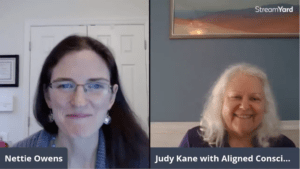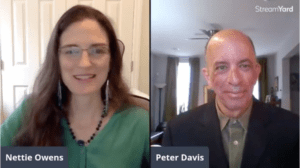What is ESG?
Some people might actually relate more to the original concept, which was socially responsible investing or SSRI. These days, it’s referred more often as sustainable and responsible investing.
But this is a strategy, a way that we can work investments into achieving a specific, long-term goal, namely by investing in things that are protecting the environment and things that are protecting society. ESG, which has become much more of the coined term these days, stands for environmental, social, and governance factors. These are the criteria that we use to evaluate whether or not an investment strategy is sustainable. The two tend to get thrown around interchangeably in the industry a bit. But it’s helpful to make that distinction. And it’s become quite important these days, for a lot of reasons, namely, because many businesses are starting to consider more socially conscientious business practices and sustainable business practices as well. So, this is why it’s important to know that term.
What’s made ESG popular in the last several years?
It’s snowballed actually into a larger avalanche that just keeps on going. It hasn’t just all of a sudden become popular, which is kind of funny. It actually started being measured as a viable investment strategy with sustainable influence since about the mid-90s. But it’s really taken off from 2010 onward. And part of the reason for that avalanche, if you will, was the market collapse in 2008-2009.
There was a lot of distrust in the industry. This was one way to ensure that businesses understood that they needed to adhere to their shareholders, as well as to consider the needs and considerations of stakeholders, those in the community that they operate in. It goes beyond just making money for this group. I need to consider everybody that comes into contact with my business.
So, the more companies started to do that, and the more society started to shift – through things like administration changes, social injustices, gender inequality debates – over the years, it rolled into what we see it as now.
In the pandemic, for instance, the global pandemic has really turned, and I forget who said this, but they call it the use of ESG factors – bull market luxury and a bear market necessity. And it’s really important because it helps to factor out companies that are just going to cause problems. We want to think about it that way. If they’ve really not considered the wants and needs of their stakeholders and shareholders, they’re just going to run into a lot of issues long term.
So, they need to make sure that they can withstand something like a global pandemic and be able to adjust their business practices accordingly. Honesty, that’s really how it kind of flew down the mountain, but it’s still rolling. Currently, one in every $3, under professional management in the US, uses some kind of sustainable investment screen.
Can you share what the three factors of ESG – environmental, social, and governance – look like?
They’re pretty straightforward.
The environmental factor is obviously going to be anything that impacts our physical world, the world we live in. Issues, specifically related to climate change, have been the biggest ones. Things affecting the forests, water usage, resource usage, the health of communities based on the air they breathe, the water they drink, the trees, and how they’re being used. And I would say yes, anything affecting the physical world can really fall under that environmental umbrella.
Social, on the other hand, is a little more of a catch-all. And the reason I say that is because it’s specific issues that are related to human beings. Anything under the human rights umbrella – human trafficking, slavery issues, gender equality, racial inequalities – trying to address all the factors that could conceivably impact people and whether or not they work for the company. Generally, if they’re stakeholders in the community, that’s one factor too.
And then governance has been used for a long time. It’s fixating on the way companies are run. Do they have an independent board of directors? Who’s their board chair? Are they independent? How are they compensated? Do they have a good proportion of minorities and women represented? So those are just examples of factors that they’re looking at here.
Why is it that this information is becoming important now – when really it should be good information at any time?
You’re not the first one to ask that.
Many people think that it has to be some sort of politicized issue when it really isn’t. If we really care about the long-term viability of corporations, we need to think about ESG.
Unfortunately, in economics, we think of everything as being linear. You know, we start here, we end up here, and we have to go through this line, and it has to keep going up forever. But there are boundaries.
We’re on a finite rock spinning around the sun, and we can’t use up everything and populate the planet until it explodes. There’s a cap to something. There’s a threshold. And recognizing where those boundaries are, we can develop businesses to operate effectively within that structure.
So, rather than looking at economic activity, like an airplane taking off, we can look at it like the growth of a tree. It starts off really small, but it keeps going, and it keeps going, and then it gets huge. But then it stops getting super huge, and then it just stays big. Then it lasts for hundreds of years, potentially. So that’s the way we need to think more about economics and businesses in general because the ones that really care about that are the ones that are going to survive long term.
3 Action Steps
- Consider implementing more socially conscious business practices into your personal business.
- When investing, looking at the ESG of a company to help you decide as to where to put your money.
- Understand that ESG has been around for a while now but is steadily growing in popularity as people learn to understand its importance.
Connect with Jennifer Coombs at: https://www.linkedin.com/in/jennifernicolecoombs/ or https://twitter.com/JNCoombs
Please comment below. I would love to hear from you.
-Nettie














No comments yet.